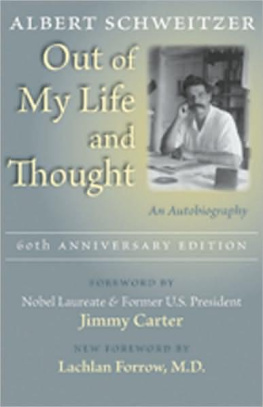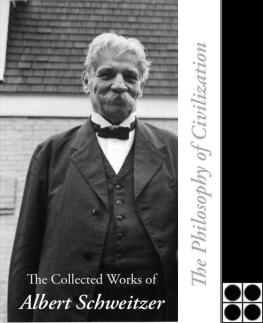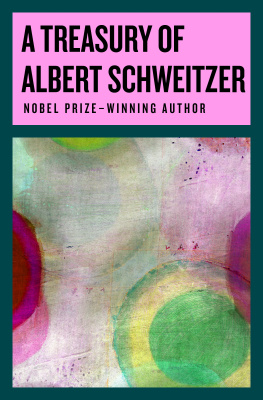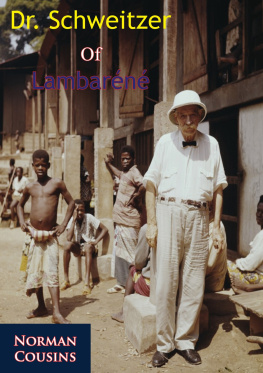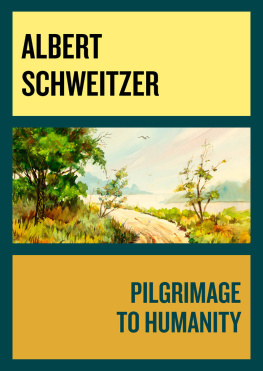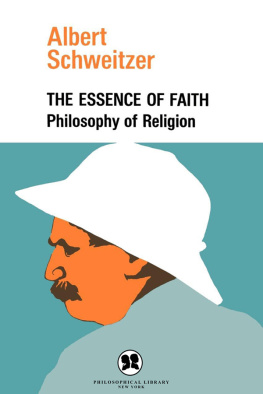The Albert Schweitzer Library
The Albert Schweitzer Library, published in association with the Albert Schweitzer Institute for the Humanities, presents new editions of the writings of Albert Schweitzer in English translation. The library will reflect the extraordinary scope of Schweitzer's knowledge and achievements in theology, music, history, and humanitarian philosophy.
It will also restore to print his autobiographical writings and include new translations and collections of works never published in book form.
The Quest of the Historical Jesus: A Critical Study of ItsProgress from Reimarus to Wrede
The Primeval Forest
The Mysticism of Paul the Apostle
Out of My Life and Thought: An Autobiography
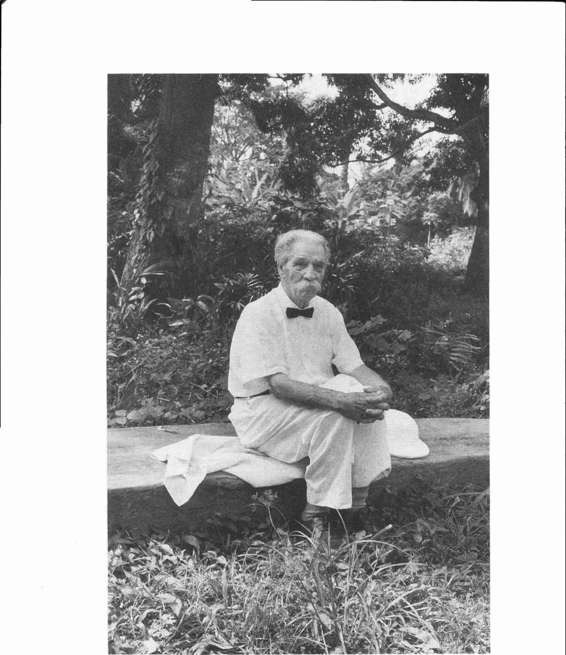
Albert Schweitzer, 1965
Courtesy of the Albert Schweitzer Institute for the Humanities Out of My Life
and Thought
An Autobiography
Albert Schweitzer
Translated by Antje Bultmann Lemke
Foreword by President Jimmy Carter
Preface by Rhena Schweitzer Miller and Antje Bultmann Lemke The Johns Hopkins University Press / Baltimore and London in association with
The Albert Schweitzer Institute for the Humanities Copyright 1933, 1949 by Henry Holt and Company, Inc.
Copyright 1990 by Rhena Schweitzer Miller Translation copyright 1990 by Antje Bultmann Lemke Preface copyright 1990 by Rhena Schweitzer Miller and Antje Bultmann Lemke
Foreword 1998 The Johns Hopkins University Press All rights reserved
Printed in the United States of America on acid-free paper Johns Hopkins Paperbacks edition, 1998
9 8 7 6 5 4 3
This edition authorized by Rhena Schweitzer Miller and by the Albert Schweitzer Institute for the Humanities, Dr. Harold Robles, President.
All photographs are courtesy of the Albert Schweitzer Institute for the Humanities.
The Johns Hopkins University Press
2715 North Charles Street
Baltimore, Maryland 21218-4363
www.press.jhu.edu
Library of Congress Cataloging-in-Publication Data Schweitzer, Albert, 1875-1965.
[Aus meinem Leben und Denken. English]
Out of my life and thought: an autobiography / Albert Schweitzer ; translated by Antje Bultmann Lemke ; foreword by Jimmy Carter ; preface by Rhena Schweitzer Miller and Antje Bultmann Lemke.
p. cm. (The Albert Schweitzer library) Includes bibliographical references and index.
ISBN 0-8018-6097-0 (pbk. : alk. paper)
1. Schweitzer, Albert, 1875-1965. 2. Strasbourg (France)Biography.
3. Missionaries, MedicalGabonLambarene (Moyen-Ogooue)Biography.
4. TheologiansEuropeBiography. 5. MusiciansEuropeBiography.
I. Lemke, Antje Bultmann. II. Title. III. Series.
CT1018. S45A282 1998
610'.92dc21
[B] 98-28166
CIP
A catalog record for this book is available from the British Library.
Contents
Foreword, by President Jimmy Carter ix
Preface, by Rhena Schweitzer Miller and
Antje Bultmann Lemke xi
2 Paris and Berlin, 1898-1899 15
5 Teaching Activities at the University of Strasbourg. The Quest of the Historical Jesus 43
6 The Historical Jesus and the Christianity of Today 53
12 Literary Studies During My Medical Course 117
13 First Activities in Africa, 1913-1917 136
20 Two Years in Europe. The Mysticismof Paul the Apostle 216
Photographs follow page 146.
Foreword
Albert Schweitzer brought to the early
twentieth century one of the most pow
erful and wide-ranging intellects the
world has seen. He not only studied but
also mastered philosophy, music, theol
ogy, and medicine. He even became the
worlds authority on Bach and organ
building. Then Dr. Schweitzer demon
strated his gratitude for the gifts he had been given by devoting the majority of
his life to relieving the suffering of the people of Central Africa.
Despite an isolation that is hard to
fathom in our age of easy communica
tions, while in Africa Dr. Schweitzer
stayed current on the affairs of the
world and provided commentary on ethics, war, nuclear weapons, and environmental degradation. His eclectic interests benefited not only Africa but the entire world.
President Jimmy Carter
Preface
"I want to be the pioneer of a new
Renaissance. I want to throw faith in
a new humanity like a burning torch
into our dark times." So Albert
Schweitzer proclaimed in the preface
to his book Civilization and Ethics in 1923.
Out of My Life and Thought, the
book he considered his most impor-
tant, provides the key to understand
ing the man, his thought, and his work.
It is the testimony of this pioneer
whose philosophy of respect for all life is essential if we are to succeed in moving from the dark ages of religious and
political strife toward a new Renaissance embracing the recognition of human rights, of environmental responsibil-ities, and of political interdependence.
In this book he describes how he became Schweitzer the theologian, the philosopher, the musician, and the medical doctor. The many facets of his personality, his abundance of knowledge in such different fields made him the active and spiritual center of his hospital in Lambarene and a figure of worldwide influence and recognition.
As to the origin of his autobiography, he told the readers of the first edition of 1931: "In 1925 I wrote a forty-two-page account for the seventh volume of the scholarly series Contemporary Philosophy in Self-Portraits, published by Felix Meiner in Leipzig.... When this treatise was published as a separate book, many readers took it to be an account of my whole life and thought. To remedy this mis-conception I decided to complete the initial study in such a way that it would tell not only about my scholarly work but also about my life and thought in general."
Out of My Life and Thought is the only book Schweitzer completed in Africa, and thirty years later he wrote to a friend in Paris: "That I was able to write this book I owe to the two physicians who assisted me in Lambarene.
When they heard about the publisher's interest, they offered to take over some of my work so I could be at the hospital only in the morning. By writing every afternoon and until midnight, I was able to complete the manuscript in five months. Later on I could never have taken so much time off to concentrate on my writing. It gave me the opportunity to express my thoughts on religion, on philosophy and the arts, and to pave the way for my reflections on the principle of Reverence for Life, which can motivate us to return to a civilization that is determined by humanism."
The first German edition of 1931 was translated by Schweitzer's friend C. T. Campion and published in 1933
by Allen & Unwin in London and by Henry Holt in New York. Other translations followed, and at last count there were nineteen, from Chinese and Czech to Tamil and Tu-legu. Some translations, for example that of 1959 in Oriyan, an Indian language, include prefatory letters by Hermann Hesse and Pere Dominique Pire.
According to the notes in Schweitzer's personal German copy, a French translation was intended as early as 1932.
Yet, as with several unfinished manuscripts, he did not find the time to devote to this project.
In 1953 another attempt at a French edition was made, when Madeleine France translated the German original.
Schweitzer wanted to review the manuscript before its publication but he had other priorities. With his acceptance of the Nobel Peace Prize in 1954, his eightieth birthday in 1955, and his appeal in 1957 for a nuclear test ban, his days and nights were filled with correspondence and preparation of lectures, which were of pressing concern to him.
Next page
